News
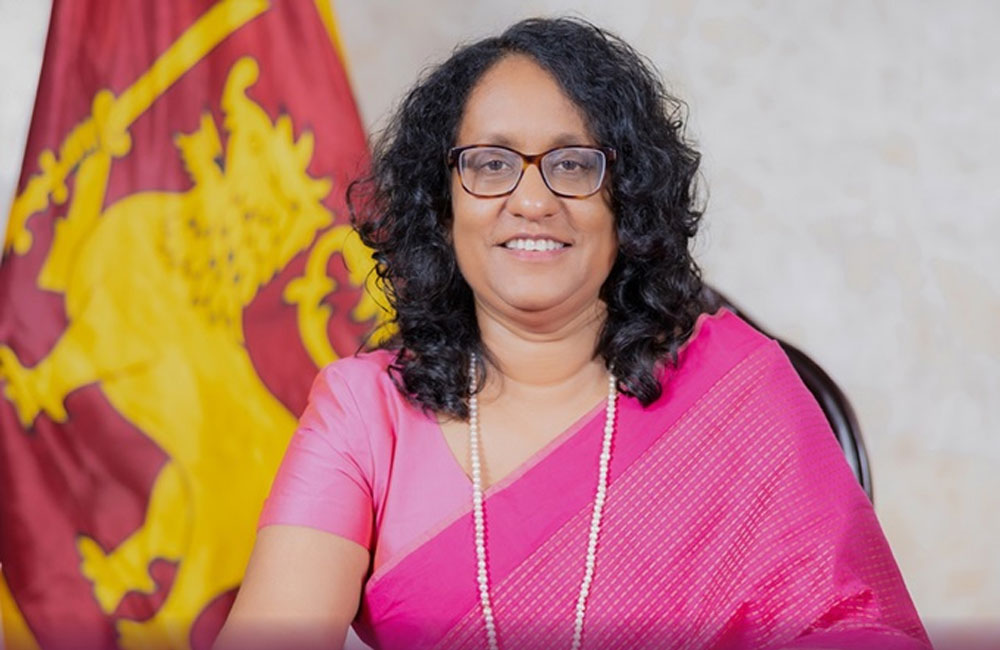
Entrepreneurial development essential for achieving govt’s vision to attract investment - PM
Prime Minister Dr. Harini Amarasuriya stated that as the country moves towards a digital economy through a new transformation, all sectors must work together in the national mission of empowering local entrepreneurs.
The Prime Minister made these remarks while participating in the inauguration ceremony of Global Entrepreneurship Week, held under the theme “Together We Build,” at Temple Trees premises yesterday (14). The event was organized by the Ministry of Digital Economy, the Prime Minister’s Media Division stated.
Addressing the event, the Prime Minister further stated:
“Global Entrepreneurship Week 2025 begins today. It actively contributes to building an entrepreneurial culture in the country and creating the necessary opportunities for that purpose. This week aligns with our national objectives. Creativity, collaboration, and innovation are vital for the future development of the country.
Our government’s vision is to create a country where ideas become opportunities, innovation attracts investment, and citizens can benefit from them. Entrepreneurial development is essential for achieving this vision. Similarly, entrepreneurship is also a crucial factor for economic diversification, export growth, youth empowerment, and balanced development.
During Global Entrepreneurship Week in 2024, over 20,000 people engaged in more than 207 programs conducted across 25 districts islandwide.
According to the 2024 Global Innovation Index, Sri Lanka ranks 89th. Although we show relatively good performance in innovation outputs, data makes it clear that innovation inputs, such as infrastructure and investment, are still at a weak level.
The Global Entrepreneurship Monitor (GEM) Report (2024/25) states that 49% of adults worldwide refrain from starting a business due to fear of failure. This highlights the importance of building a strong support system.
In 2023, Sri Lanka gained a significant demographic advantage, with a youth population of approximately 5.1 million aged between 15 and 29 (23.6% of the total population). Although this youth population is digitally literate, we understand that they still face challenges such as limited access to capital, fewer mentorship opportunities, and a general reluctance to take risks.
Therefore, the government has established a Digital Task Force consisting of 30 members under education reforms. Measures are being implemented to connect all schools to the internet, provide smart boards, computers, and digital devices, and enhance knowledge. A full policy framework for digital education is being prepared to be presented to the Cabinet by March 2026.
The 2026 National Budget has allocated Rs. 1.5 billion as a Start-Up Fund to advance the digital economy and entrepreneurship among youth and emerging entrepreneurs.
Additional provisions have been allocated for AI and cloud computing research, digital infrastructure development (broadband vouchers), and investment incentives. I would also like to mention that the government has proposed a Digital Economy Act, a new Digital Economy Authority, the Sri Lanka Unified Digital Identity (SL-UDI), and an Integrated Digital Payments System.
For the development of the economy and every sector of the country, we must all work together for a national agenda. Rather than working separately, it is necessary for all to start a collaborative national movement.
The government, industry, academia, and entrepreneurs must collaborate in resource mobilization, building mentorship networks, simplifying regulations, and opening access to global markets.”
The event was attended by the Deputy Minister of Digital Economy Eng. Eranga Weeraratne, Deputy Minister of Industries and Enterprise Development Chathuranga Abeysinghe, President’s Advisor on Digital Economy Dr. Hans Wijayasuriya, Secretary to the Ministry of Digital Economy Varuna Dhanapala, as well as entrepreneurs, investors, and a large gathering.
( Source : adaderana.lk)

Montana National Guard Signs MOU with Sri Lanka Armed Forces Under the State Partnership Program
United States and Sri Lanka Formalize Security Cooperation: Montana National Guard Signs MOU with Sri Lanka Armed Forces Under the State Partnership Program
Advancing Peace, Security, and Disaster Response in the Indo-Pacific
Today, at the Ministry of Defense, the United States and Sri Lanka signed a Memorandum of Understanding (MOU) formalizing the defense partnership between the Montana National Guard, the U.S. Coast Guard District 13, and the Sri Lanka Armed Forces under the Department of War’s State Partnership Program (SPP). U.S. Ambassador Julie Chung, Adjutant General of the Montana National Guard Brigadier General Trenton Gibson, and the Secretary of Defense Air Vice Marshal Sampath Thuyacontha, signed the MOU marking a historic milestone in U.S.–Sri Lanka defense relations, underscoring both nations’ shared commitment to regional stability, maritime security, and professional military collaboration in the Indo-Pacific to advance our common goal of peace through partnership.
U.S. Ambassador Julie Chung highlighted the significance of the new chapter in U.S.–Sri Lanka defense cooperation: “From wildfire response and flood relief in Montana to peacekeeping and humanitarian efforts overseas, the Montana National Guard has a proud record of service and professionalism. This partnership with Sri Lanka, reaffirmed through today’s MOU, strengthens our shared resolve for a secure Indo-Pacific—building trust, readiness, and lasting peace through partnership.”
Sri Lankan Defense Secretary Air Vice Marshal Sampath Thuyacontha (Retd) said: “This agreement represents a progressive initiative that will further enhance Sri Lanka’s defense capabilities and reinforce the enduring partnership with the United States. Over the years, our two nations have long cooperated in areas such as military training, disaster relief, and defense exchanges, fostering mutual understanding and trust. This framework will open new avenues for collaboration, promote capacity-building, and contribute to ensuring peace, security, and stability across the region.”
Brigadier General Trenton Gibson, Adjutant General of the Montana National Guard, said: “We are honored to stand shoulder to shoulder with our Sri Lankan counterparts. Together, we’ll build strength, trust, and lasting bonds that enhance the security of both our nations.”
A Partnership Rooted in Shared Security Goals
Established in 2021, the Montana–Sri Lanka partnership takes a major step forward today as the MOU formalizes a framework for deeper collaboration, strengthening professional ties and advancing joint security cooperation between the two nations. Through the State Partnership Program, the Montana National Guard, the citizen-soldier component of the U.S. Armed Forces from the State of Montana, brings extensive expertise in disaster response, homeland defense, and global partnerships. Since 2021, the Montana National Guard and Sri Lanka’s armed forces have deepened their partnership through joint training, expert exchanges, and reciprocal visits that have built trust and strengthened defense cooperation. Notable recent engagements include ATLAS ANGEL 2024 and PACIFIC ANGEL 2025, where U.S. and Sri Lankan personnel worked side by side to enhance humanitarian assistance and disaster response capabilities. Under the State Partnership Program, the U.S. Coast Guard District 13 also welcomed Sri Lanka Coast Guard officers to Seattle in August 2025 for joint training on oil spill response, including hazardous waste operations, shoreline recovery, and on-water cleanup—sharing expertise to safeguard sea lanes and protect the marine environment.
Looking Ahead
With this MOU, Sri Lanka joins a global network of 115 nations partnered with U.S. state National Guards under the State Partnership Program (SPP). The first series of joint activities under this MOU is planned for summer of 2026, focusing on disaster response, maritime domain awareness, and professional military education.
The Montana-Sri Lanka National Guard partnership will focus on:
- Joint training and professional exchanges to enhance interoperability and readiness.
- Maritime Domain Awareness cooperation, addressing trafficking, migration, and narcotics interdiction.
- Crisis response and humanitarian assistance, leveraging the Guard’s dual military–civilian capabilities, to include military medical and engineer activities.
- Aviation operations, supporting mission success through skill and excellence.
- Military and civil disaster readiness and response, military-civilian coordination for disaster preparedness, response, and recovery.
Background: The State Partnership Program (SPP) was created in 1993 by the U.S. Department of Defense—now the Department of War—after the end of the Cold War to foster enduring relationships between U.S. state National Guards and partner nations. The SPP pairs the U.S. National Guard with foreign military counterparts to support defense security goals such as civil-military preparedness, critical infrastructure protection, and defense modernization. Through exchange programs and joint capacity-building exercises, partners strengthen interoperability. Today, through the SPP, the National Guard of every state, three U.S. territories and the District of Columbia is partnered with over 100 partner countries — nations on every continent but Antarctica —promoting peace, stability, and mutual readiness through training, humanitarian assistance, and expertise exchange.
The Montana National Guard, headquartered in Helena, Montana, is composed of highly trained soldiers and airmen who serve both their state and the nation. Its participation in the SPP reflects the Guard’s dual mission: defending the United States while advancing global peace and security through trusted international partnerships.
 U.S. Ambassador Julie Chung, Brigadier General Trenton Gibson, Adjutant General of the Montana National Guard, Deputy Minister of Defense Major General Aruna Jayasekara (Retd) and Secretary of Defense of Sri Lanka Air Vice Marshal Sampath Thuyacontha (Retd) sign a Memorandum of Understanding in Colombo formalizing the U.S.–Sri Lanka defense partnership under the Department of War’s State Partnership Program on November 14, 2025. The agreement strengthens cooperation in defense, disaster response, and regional security.
U.S. Ambassador Julie Chung, Brigadier General Trenton Gibson, Adjutant General of the Montana National Guard, Deputy Minister of Defense Major General Aruna Jayasekara (Retd) and Secretary of Defense of Sri Lanka Air Vice Marshal Sampath Thuyacontha (Retd) sign a Memorandum of Understanding in Colombo formalizing the U.S.–Sri Lanka defense partnership under the Department of War’s State Partnership Program on November 14, 2025. The agreement strengthens cooperation in defense, disaster response, and regional security.


PRESS RELEASE
Tel: +94 (11) 202-8500 ● Email: This email address is being protected from spambots. You need JavaScript enabled to view it. ● Web: http://lk.usembassy.gov
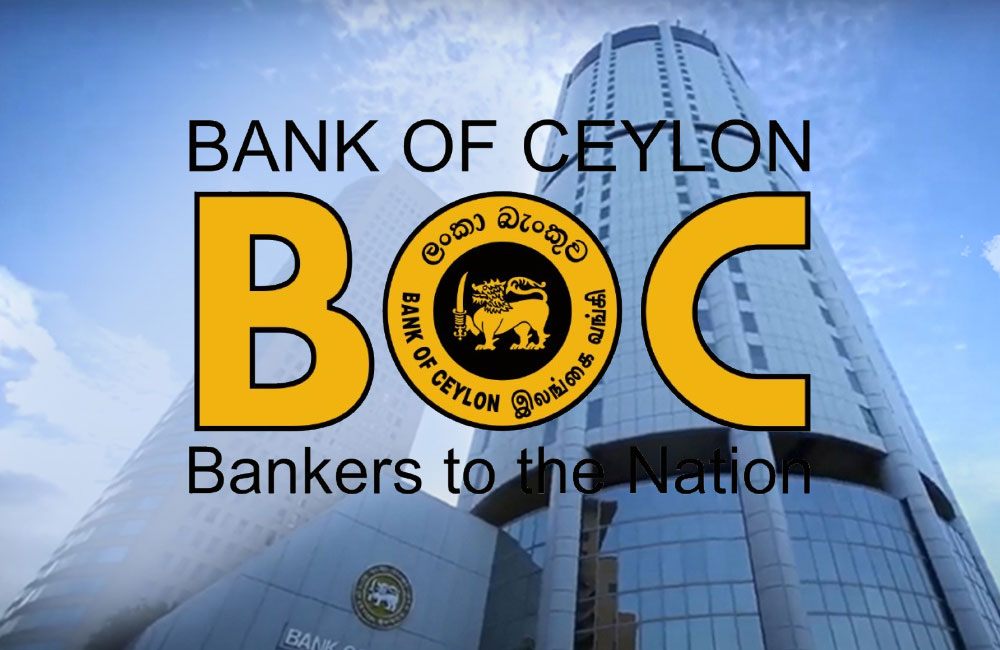
BOC’s Record Profits Signal Renewed Strength in Sri Lankan Banking
The Bank of Ceylon (BOC) has closed the first nine months of 2025 with one of its strongest financial performances in recent years, reaffirming its position as the backbone of Sri Lanka’s banking sector.
The state-owned lender posted a Profit Before Tax (PBT) of Rs. 87.7 billion, more than doubling its earnings from the same period in 2024 and underscoring its ability to expand despite challenging macroeconomic conditions.
Chairman Kavinda de Zoysa said the latest results reflect BOC’s commitment to financial inclusion and the country’s broader economic recovery. “Our strategy balances profitability with purpose. By empowering youth, SMEs, and underserved communities, we are strengthening livelihoods and the nation’s long-term resilience,” he noted.
Much of the bank’s stellar performance stems from its core banking operations. Net Interest Income surged 62% to Rs. 153.2 billion, supported by effective repricing strategies and a favourable interest rate environment. Interest income grew 15% to Rs. 368.1 billion, while interest expenses fell 5% a combination that significantly boosted margins.
Non-fund-based income also contributed strongly, with fee and commission revenue rising 11% to Rs. 16.8 billion amid increased digital banking activity and remittance flows.
BOC’s total operating income climbed 61% to Rs. 181.1 billion, while expenses grew only 6%, pushing the cost-to-income ratio down to an efficient 32%. After paying Rs. 23.4 billion in taxes on financial services and Rs. 31.9 billion in income tax, the bank reported a solid Profit After Tax of Rs. 55.7 billion. In total, BOC contributed Rs. 55.3 billion in taxes to the Treasury during the period.
Acting GM/CEO Y.A. Jayathilaka attributed the strong results to customer trust and staff dedication. He said the bank’s emphasis on responsible growth and digital innovation will continue guiding its strategy. “Each step we take is geared towards expanding opportunity and driving shared prosperity,” he said.
BOC’s assets rose 11% to Rs. 5.5 trillion by end-September, driven largely by investments in government securities. Loans increased to Rs. 2.5 trillion, reflecting renewed credit demand, while deposits rose 9% to Rs. 4.6 trillion. Despite these expansions, the bank maintained firm risk controls, recording an 18.7-billion-rupee impairment charge and holding Stage 3 loan coverage at 56.24%.
Key indicators remained robust, with ROA at 2.22% and ROE at 22.82%. Capital ratios also stayed comfortably above Basel III thresholds. Digital banking continued to expand, particularly through BOC Flex, Smart Remit, and the newly launched BizPlus Credit Card for MSMEs.
Expanding inclusion on the ground, the bank opened 50 new Agent Banking Centres and launched BOC Connect Analathivu, while the Gammana programme continued uplifting rural communities.
With major international rankings, brand awards, and an AA-(lka) Fitch rating, BOC heads into the final quarter poised for further growth as it strengthens digital services, SME lending, and sustainability initiatives nationwide.

Sri Lankan worker found murdered in Israel – Ambassador
A 38-year-old Sri Lankan national from Galle, who had arrived in Israel two months ago for employment in construction sector, was reportedly found murdered last night (13).
According to Israeli authorities, the incident has been confirmed as a murder committed by an individual of African origin.
Sri Lanka’s Ambassador to Israel, Nimal Bandara, stated that the case is being investigated by the Interpol branch of the Israeli Police.
The victim had arrived in Israel just two months ago under a employment offer facilitated by the Sri Lankan government, he added.
( Source : adaderana.lk)

Committee Stage debate of 2026 Appropriation Bill works off today
The debate on the Committee Stage or the Third Reading of the 2026 Appropriation Bill, or the 80th Budget Speech, is scheduled to commence today (15) in parliament.
The Second Reading debate, which began on November 8, continued for six days and concluded with the vote held yesterday (14) at 6.00 p.m., as scheduled by the Department of Communication of Parliament.
The Second Reading of the Appropriation Bill for the year 2026 was passed in Parliament yesterday (14) with a majority of 118 votes. A total of 160 Members of Parliament voted in favour of the Budget, while 42 voted against it. Eight MPs abstained from voting.
Beginning today, the Committee Stage debate on the Appropriation Bill will proceed for 17 days, including three Saturdays, and is expected to conclude on December 5.
Following that, the vote on the Third Reading of the Appropriation Bill will be held on December 5 at 6.00 p.m.
With this, the full Budget debate spans from November 8 to December 5, 2025.
The Second Reading of the Appropriation Bill (Budget Speech) was presented to Parliament on November 7 by President Anura Kumara Dissanayake in his capacity as Minister of Finance. The President arrived at the Chamber at around 1.30 p.m., following tradition by entering from the Office of the President located within the Parliament premises, led by the Serjeant-at-Arms.
The presentation of the Budget proposals continued until 5.50 p.m.
( Source : adaderana.lk)
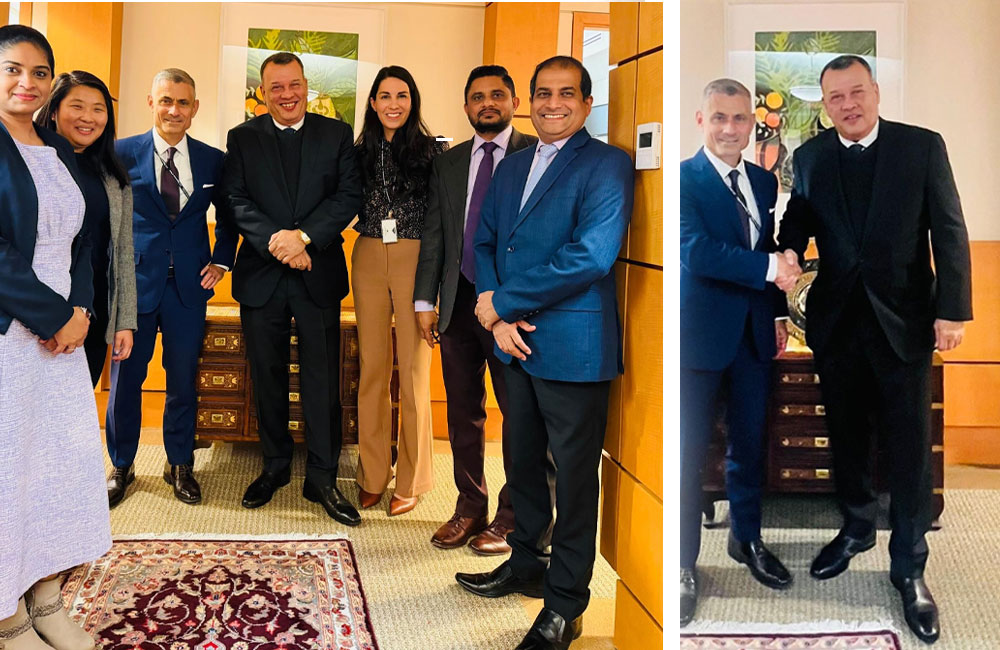
Sri Lanka–U.S. Relations Strengthened in High-Level Meeting at State Department
Courtesy Call of the Ambassador Mahinda Samarasinghe on Assistant Secretary Paul Kapur and Deputy Assistant Secretary Bethany Poulos Morrison, U.S. Department of State
The Ambassador Mahinda Samarasinghe called on Assistant Secretary for South and Central Asian Affairs, Professor Paul Kapur, and Deputy Assistant Secretary (DAS) Bethany Poulos Morrison of the Bureau of South and Central Asian Affairs of the U.S. Department of State, on 12 November 2025, at the State Department. Prof Kapur succeeded former Assistant Secretary, Amb. Donald Lu.
Assistant Secretary Paul Kapur, who has visited Sri Lanka on multiple occasions as a scholar, reaffirmed the strong and cordial relations between Sri Lanka and the United States and engaged in discussions on areas of mutual interest, including bilateral cooperation, trade engagement, and regional developments in South Asia and the Indo-Pacific. During the meeting, he emphasized the strategic significance of the U.S.–Sri Lanka partnership for regional peace, prosperity, and stability. The Ambassador conveyed appreciation for the United States’ continued engagement with Sri Lanka and underscored Sri Lanka’s commitment, including the Prosperity Guardian Mission, highlighting opportunities for collaboration with Boeing as discussed during the President’s meeting, which was facilitated by the Ambassador.
Key ongoing economic matters were addressed, including Sri Lankan exports in the context of recent U.S. trade-tariff concerns, and the importance of strengthening market access, trade facilitation, and the investment climate. The Ambassador apprised both Assistant Secretary Kapur and DAS Morrison of the latest developments in the ongoing USTR negotiations. He further highlighted Sri Lanka’s strategic location in the Indian Ocean and expressed interest in constructive engagement with the United States in areas such as maritime security, connectivity, supply-chain resilience, and education and training cooperation, particularly in hydrographic mapping. The Ambassador emphasized the importance of sharing data accumulated by foreign partners in Sri Lankan waters, noting the Standard Operating Procedure (SOP) currently under finalization.
The Ambassador also requested the provision of a fifth Coast Guard cutter and briefed the U.S. side on how previously provided cutters have been utilized to enhance Indo-Pacific security, particularly in mitigating drug trafficking and human smuggling. Continued U.S. support for Sri Lanka’s capacity-building initiatives was welcomed. The meeting concluded with both sides reaffirming their commitment to further advance the Sri Lanka–U.S. partnership across bilateral and multilateral platforms trafficking and human smuggling and welcomed continued U.S. facilitation for Sri Lanka’s efforts in capacity-building.
The meeting concluded with both sides reaffirming their commitment to further advancing the Sri Lanka–U.S. partnership across bilateral and multilateral platforms.
Deputy Chief of Mission Madhuka Wickramachchi, Counsellor Chathuri Perera, and Defence Advisor Commodore Dumindu Abeywickrema accompanied the Ambassador to the meeting. Director, Alla Kamins and Sri Lanka Desk Officer, Iris Kim, also participated from the U.S. Department of State.
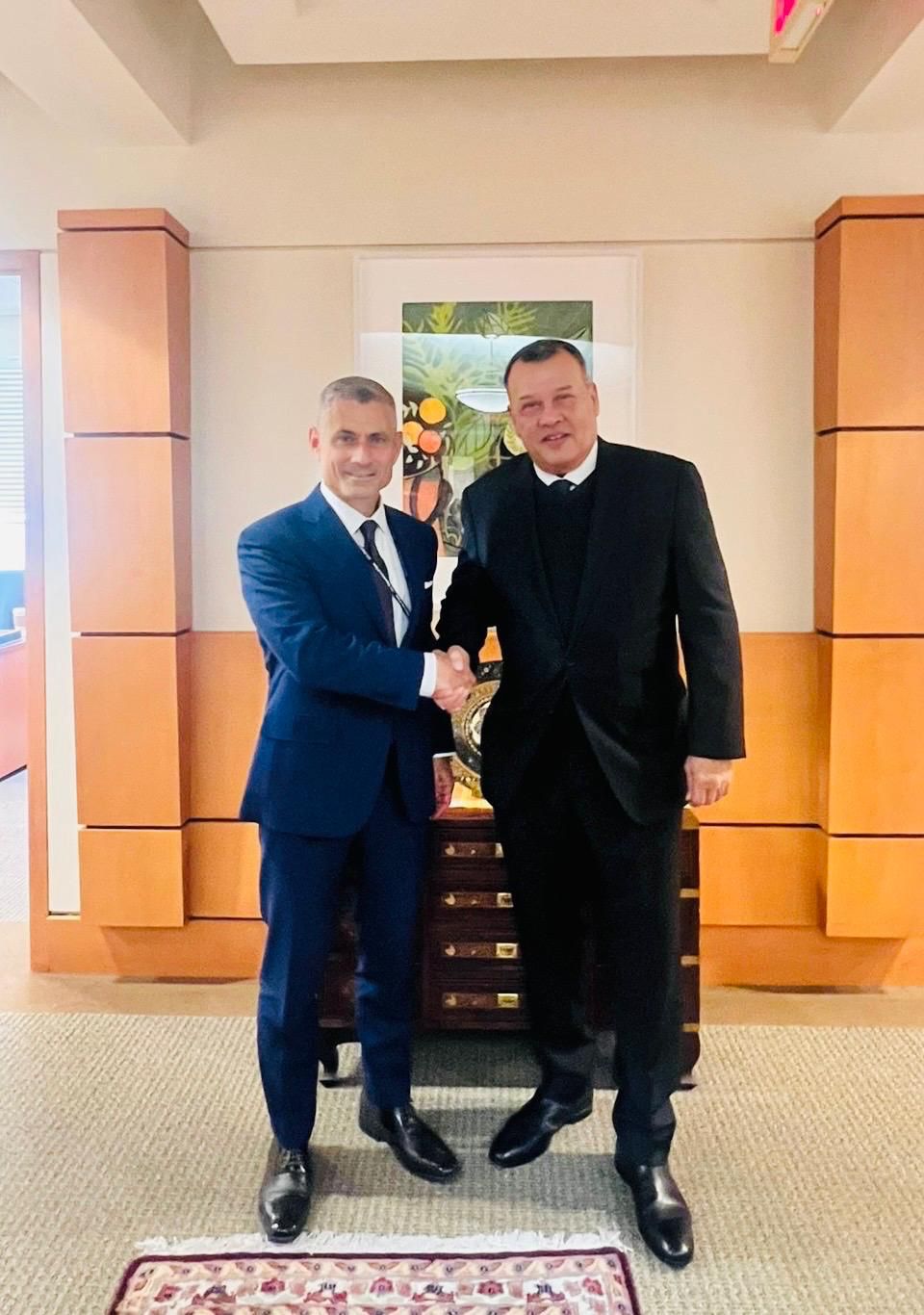
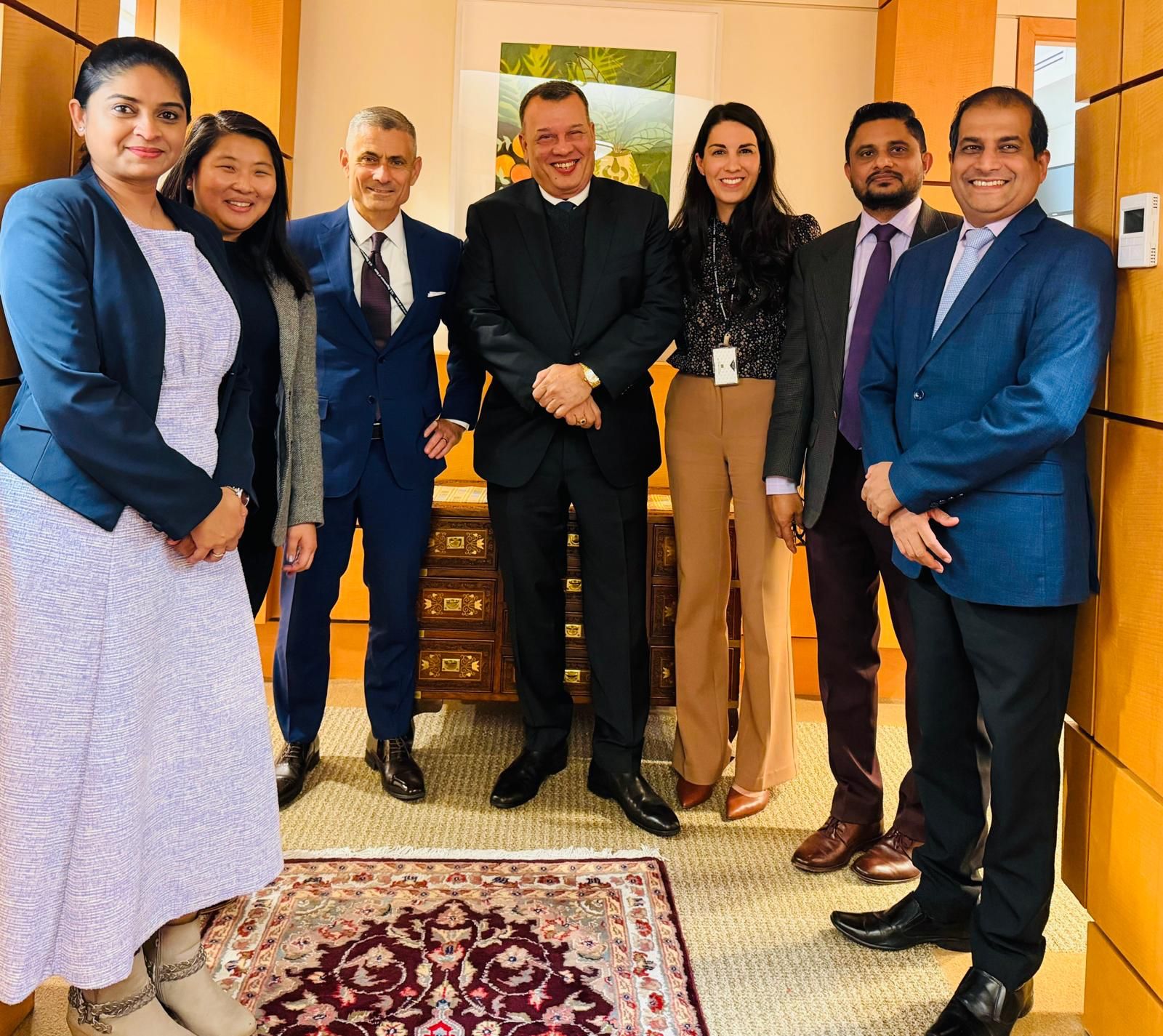
Embassy of Sri Lanka Washington D.C
14 November 2025
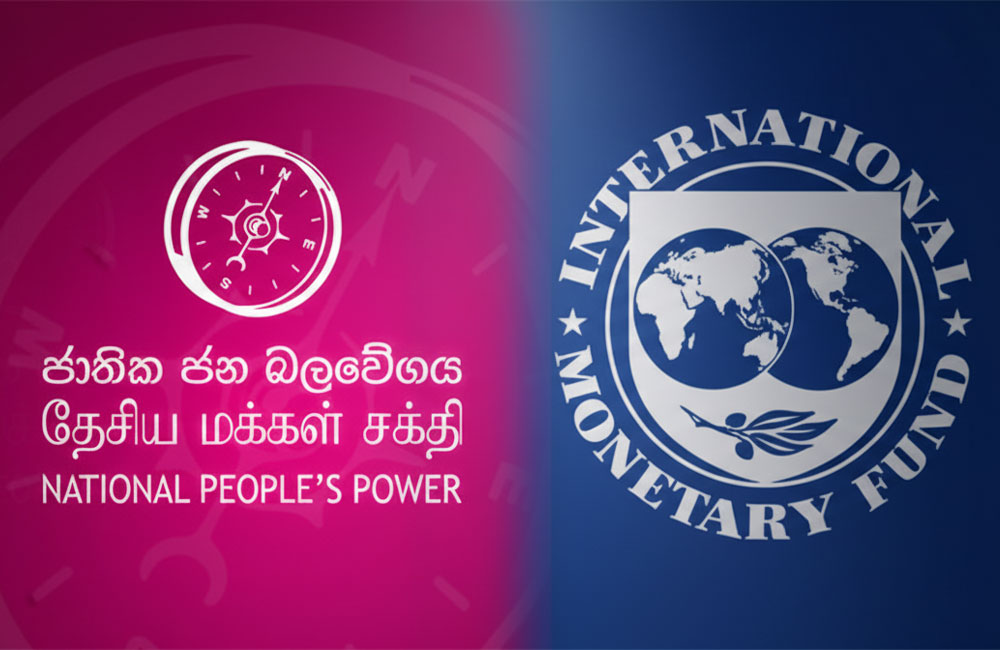
IMF Reforms Face Uncertainty under Slowing NPP Governance
Sri Lanka’s hard-won economic stabilisation, secured through the IMF-brokered rescue package after the 2022 collapse, now faces renewed uncertainty as global lenders carefully examine the 2026 Budget presented by the new JVP-led NPP government.
The IMF confirmed yesterday that it is reviewing the budget and assessing whether the administration’s fiscal direction remains consistent with the commitments signed under the US$3 billion Extended Fund Facility (EFF).
IMF Director of Communications Julie Kozack told reporters in Washington that the Fifth Review is expected to reach the Executive Board “in the coming weeks.”
A successful review will unlock the next tranche of US$347 million funding Sri Lanka critically needs to maintain reserves, service external debt, and keep its fragile recovery on track.
A staff-level agreement was already completed on 9 October, but the Fund now needs to verify that key reforms, revenue measures, and fiscal discipline have not drifted under the new administration.
Kozack noted that the IMF’s current assessment focuses heavily on whether the government’s fiscal framework aligns with programme targets, especially given the “structural reforms essential for strengthening Sri Lanka’s growth outlook.”
These reforms from trade liberalisation and streamlined FDI regulation to governance improvements and expanded social protection were central to stabilising the economy after the 2022 crisis. The question now is whether they will continue at the required pace.
Concerns have mounted within economic circles that the NPP government’s policy rollout has been slow, uncoordinated, and often ideologically conflicted.
Analysts warn that a drift away from predictable, rules-based policy implementation could weaken investor confidence, delay external financing, and threaten the hard-earned stability achieved since 2022.
Kozack appeared to underline these concerns subtly, emphasising that protecting vulnerable groups must remain a priority a reminder that fiscal populism, without structural reform, risks reversing progress.
International rating agencies are also watching closely. Fitch Ratings noted this week that while the 2026 Budget technically keeps Sri Lanka aligned with its fiscal reform trajectory, slower revenue growth, lower-than-planned capital expenditure, and risks emerging after the completion of the IMF programme could undermine the medium-term outlook.
The agency said the government still appears committed to reducing debt-to-GDP ratios after exceeding targets under the 2025 Budget, but warned that sustained revenue performance will be crucial.
Economists say the next few months will determine whether Sri Lanka can maintain the reform momentum that pulled it back from the brink in 2022 or whether the new administration’s hesitant, politically cautious approach will place the IMF programme, and the country’s recovery, in jeopardy.
With the Fifth Review nearing its decisive stage, the government’s ability to meet its commitments will shape both investor sentiment and Sri Lanka’s path to long-term stability.
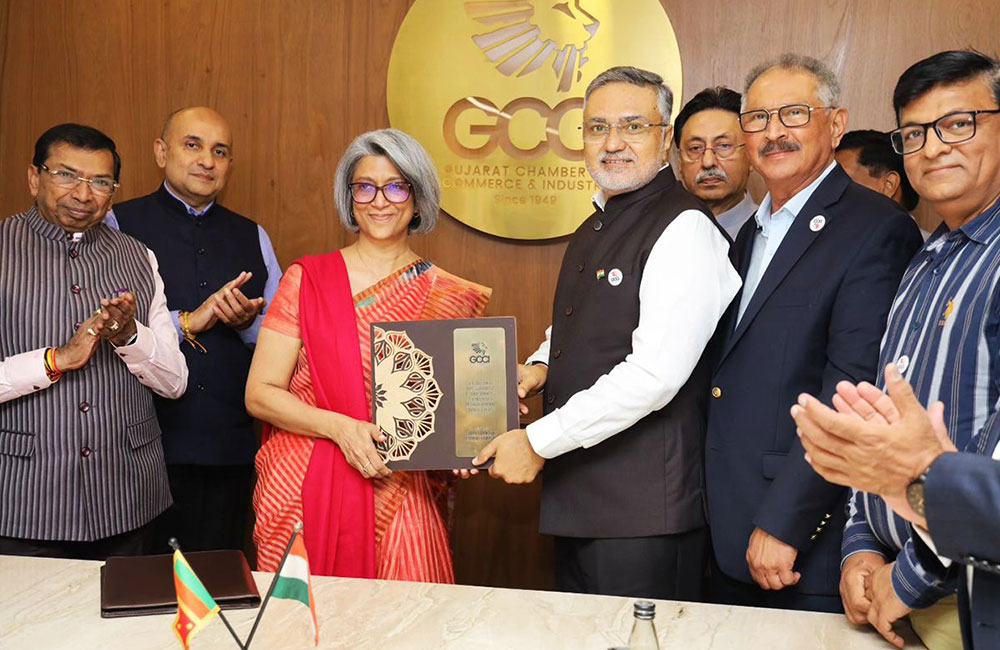
The Ceylon Chamber of Commerce and Gujarat Chamber of Commerce & Industry Sign MoU
The Ceylon Chamber of Commerce and the Gujarat Chamber of Commerce & Industry (GCCI) signed a Memorandum of Understanding on 13 November 2025 in Ahmedabad, Gujarat, to strengthen bilateral trade, investment, and business cooperation between Sri Lanka and Gujarat.
The MoU was signed by Chairperson of The Ceylon Chamber of Commerce, Krishan Balendra, and President of the Gujarat Chamber of Commerce & Industry, Sandeep R. Engineer.
The signing took place during the visit of Sri Lanka’s High Commissioner to India, Mahishini Colonne, marking her first official state-level engagement since assuming office.
The initiative and arrangements leading to the signing were facilitated by Sri Lanka’s Honorary Consul in Gujarat, Rakesh Shah, whose efforts played a key role in bringing the two chambers together.
Under the MoU, the Ceylon Chamber and the GCCI will collaborate to promote business opportunities, facilitate joint ventures and partnerships, organise B2B engagements, and enhance knowledge-sharing between the private sectors of both economies. It is hoped that the partnership would also serve to deepen maritime and logistics cooperation and build on the complementarities between Gujarat’s major ports and Sri Lanka’s role as a regional transshipment hub.
Both Chambers expressed confidence that the MoU will open new avenues for trade, investment, and sustainable economic cooperation.
High Commission of Sri Lanka New Delhi
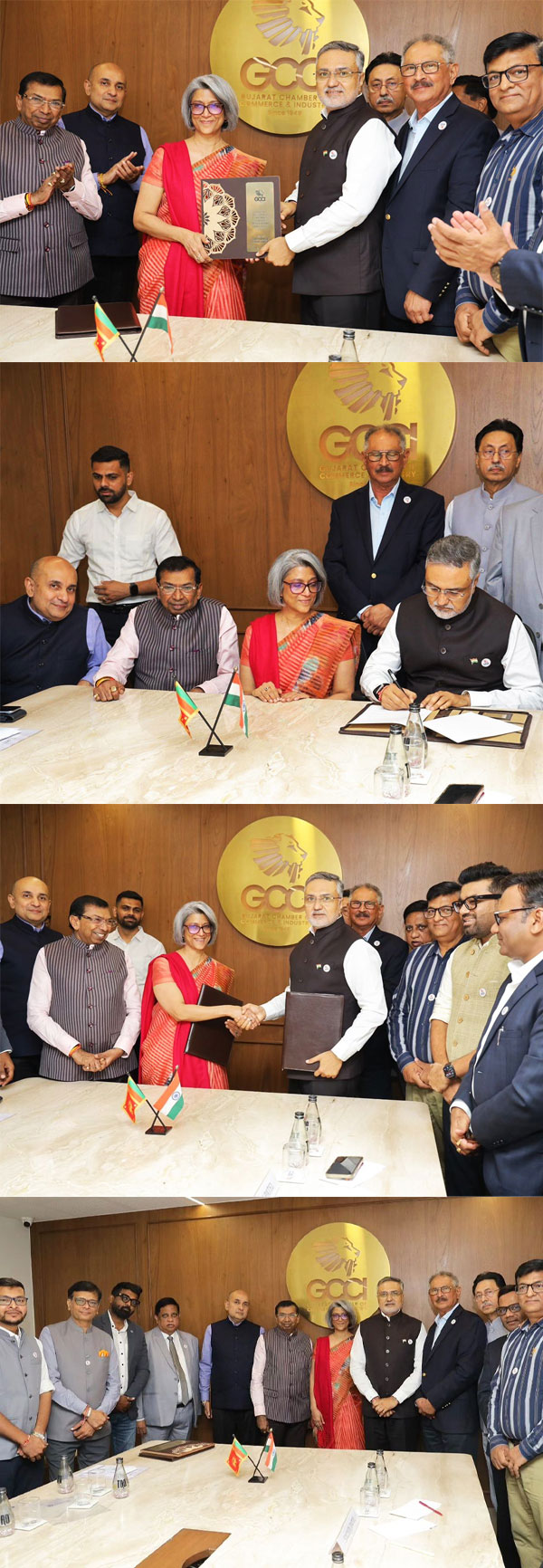
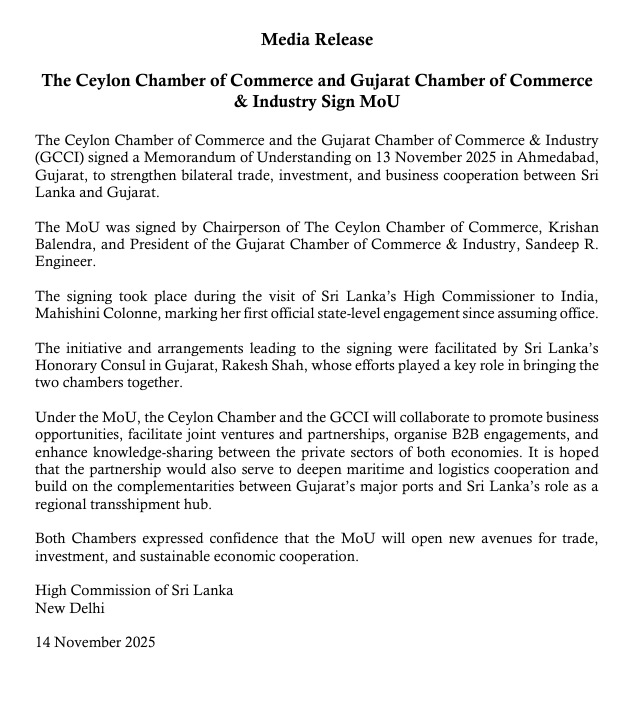

Sri Lanka Unveils Major Push to Accelerate Digital Economy
Sri Lanka’s 2026 Budget has placed the country’s digital transformation at the centre of its economic recovery strategy, with the government pledging Rs. 35.6 billion (US$120 million) to modernise public services, strengthen digital infrastructure and establish the foundations of a competitive digital economy.
The investment marks one of the most ambitious technology-focused commitments made in recent years as the country attempts to boost efficiency, attract investment and expand digital access nationwide.
President and Finance Minister Anura Kumara Dissanayake said the multi-layered programme aims to ensure that digital inclusion reaches every part of the country, positioning Sri Lanka to emerge as a regional hub for data-driven services.
He stressed that the development of data centres will be a top priority, noting that creating an investor-friendly environment will be essential in drawing foreign and local participation.
Incentives such as concessional land, green-energy promotion and low-cost electricity during the initial years of operation will form part of the government’s strategy to strengthen investor confidence.
As an initial step, the government has allocated Rs. 500 million for 2026 to lay the groundwork for data centre development.
To further accelerate digital infrastructure rollout, a simplified and faster approval process for constructing communication towers will be implemented. All new towers built under this programme will qualify for a five-year tax exemption, a move expected to reduce costs and encourage network expansion.
Supporting innovation is another major focus. A new startup fund, backed by an initial allocation of Rs. 1.5 billion under the Ministry of Digital Economy, will be launched next year to provide financial and technical support to emerging entrepreneurs.
The government also plans to introduce “Virtual Special Economic Zones” through the Board of Investment, designed to function as digitally enabled export hubs aimed at generating employment and high-value services.
One of the most significant milestones in the digitalisation programme will be the rollout of the country’s first digital National Identity Card early next year.
The initiative forms part of the broader integration of the Electronic National Identity Card (e-NIC) with the Unique Digital ID (SL-UDI) system, a combined framework for secure personal identification.
Five Indian firms were recently shortlisted to operate the digital ID system, signalling progress in procurement and implementation.
The budget also allocates Rs. 750 million towards establishing an AI data centre to strengthen domestic capabilities in emerging technologies. In parallel, all government transactions will shift to digital payment systems, with service fees and QR charges for payments below Rs. 5,000—waived to encourage public adoption.
Additional measures include tax waivers for private-sector investments in expanding internet coverage, broadband vouchers to support online learning for children, and the development or reactivation of IT zones to bolster the broader technology ecosystem.
Together, these initiatives underscore the government’s intent to fast-track Sri Lanka’s digital transition and leverage technology as a key driver of economic growth in the years ahead.
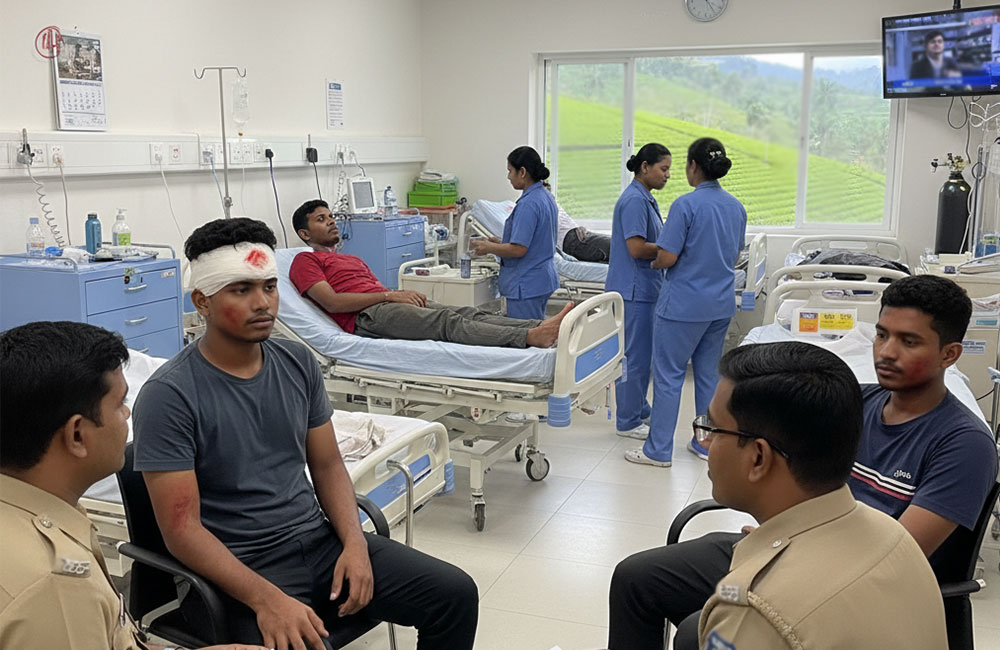
Six students from Ruhuna Uni. hospitalised after wasp attack
A group of students from the Faculty of Engineering of the University of Ruhuna have been hospitalized following a wasp attack this morning (14), police reported.
The students, who had arrived for a practical workshop at the Plantation Training Center in the Morar Estate in Bogawantalawa, were attacked by a swarm of wasps after a wasp nest in a tree was disturbed.
Six students sustained injuries as a result of the attack and were admitted to the Bogawantalawa Regional Hospital, police reported.
Many students from several universities are currently staying in hostels at the location for the practical workshop and are expected to take part in the workshop activities
Bogawantalawa Police are conducting further investigations into the incident.
( Source : adaderana.lk)
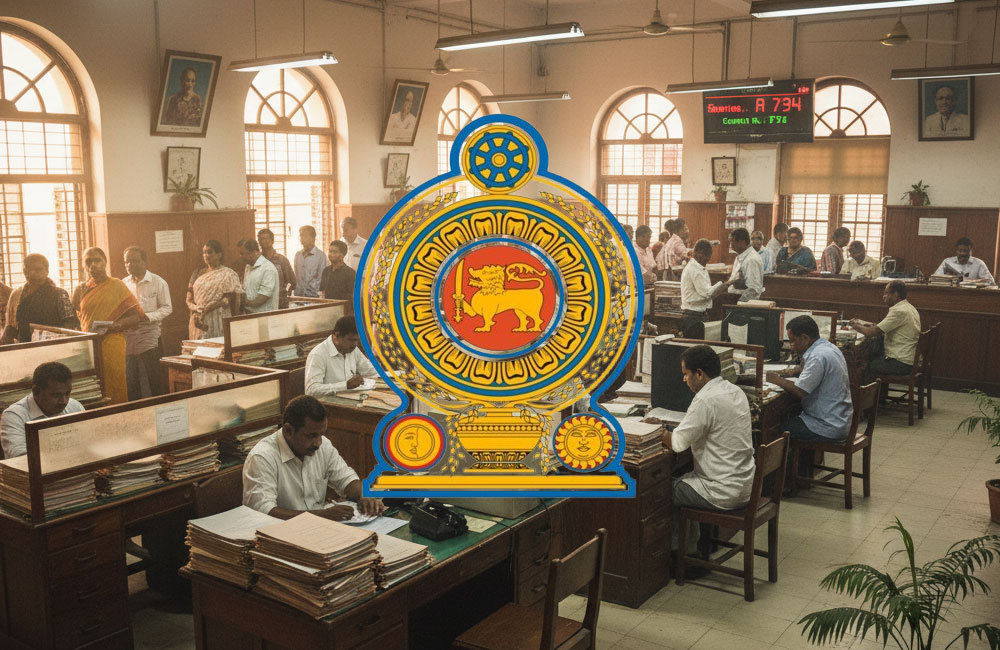
Sri Lanka’s Public Sector Crisis Threatens Economic Recovery Path
Sri Lanka’s long-standing public sector overstaffing problem has re-emerged as a critical economic threat in 2025, with new data showing that the state machinery already one of the largest in South Asia continues to drain scarce fiscal resources and obstruct national productivity. Government officials, including Deputy Minister of Industries Chathuranga Abeysinghe, now openly admit that the system is “bloated at the bottom tier” due to decades of politically driven recruitment.
As of 2025, Sri Lanka’s public sector including ministries, departments, state-owned enterprises (SOEs), statutory bodies and security forceshas swollen to approximately 1.38 million employees, edging closer to its approved cadre of 1.5 million. This makes the public service larger than the total private-sector workforce employed by the country’s top 50 corporations combined. Yet productivity indicators remain stagnant, and service delivery continues to deteriorate, particularly in education, healthcare, and local administration.
Speaking at a Deloitte post-budget forum, Deputy Minister Abeysinghe acknowledged a truth that previous governments avoided. “The public service has been expanded artificially, largely at the bottom, where jobs were handed out as political favours. What we are trying to do now is rightsizing—supported by technology to restore efficiency,” he said. The 2025 Budget’s proposed 75,000 new recruitments, he emphasized, would focus strictly on essential skilled categories such as nurses, teachers, and engineers, rather than unqualified general staff.
The most controversial segment remains the so-called “Development Officers”—a politically inflated cadre of graduates placed in state offices often without defined duties. As of January 2025, Sri Lanka employed nearly 104,000 Development Officers, despite an approved cadre of 78,000. Many report to district or divisional secretariats where, according to senior officials, “there are not enough desks or functional tasks for them.”
This surplus workforce places a heavy burden on public finances. Salaries, allowances, pensions, and overtime consume almost 86% of government revenue, leaving limited room for development spending. Sri Lanka’s public-sector wage bill is now one of the highest in Asia relative to GDP. Economists warn that unless the system is restructured, the country’s recovery from the 2022 financial crisis will be slowed significantly.
A second structural problem is the expanded post-war military. Unlike countries that downsized after conflict, Sri Lanka never undertook a demobilisation program. Nearly 40,000 personnel from the 2006–2009 recruitment wave will complete 20 years of service over the next three years. The government now faces the challenge of upskilling and reintegrating them into the economy, while thousands of deserters remain outside the formal system, limiting the country’s productivity potential.
Despite promises of voluntary retirement schemes, the government insists there will be no mass layoffs. Instead, it expects digitalisation to gradually “rightsize” ministries within three to five years. However, experts caution that without skill development, performance evaluations, and enforcement of merit-based hiring, digitalisation alone cannot fix structural inefficiency.
The consequences are already visible: parents opting for private education despite paying taxes for state schooling; patients “channeling” private doctors due to failing hospitals; and taxpayers subsidising loss-making SOEs, including enterprises re-nationalised during the Rajapaksa era.
With Sri Lanka aiming for long-term economic stability under IMF-guided reforms, analysts argue that meaningful public-sector restructuring is no longer optional—it is the cornerstone on which the country’s future progress depends.
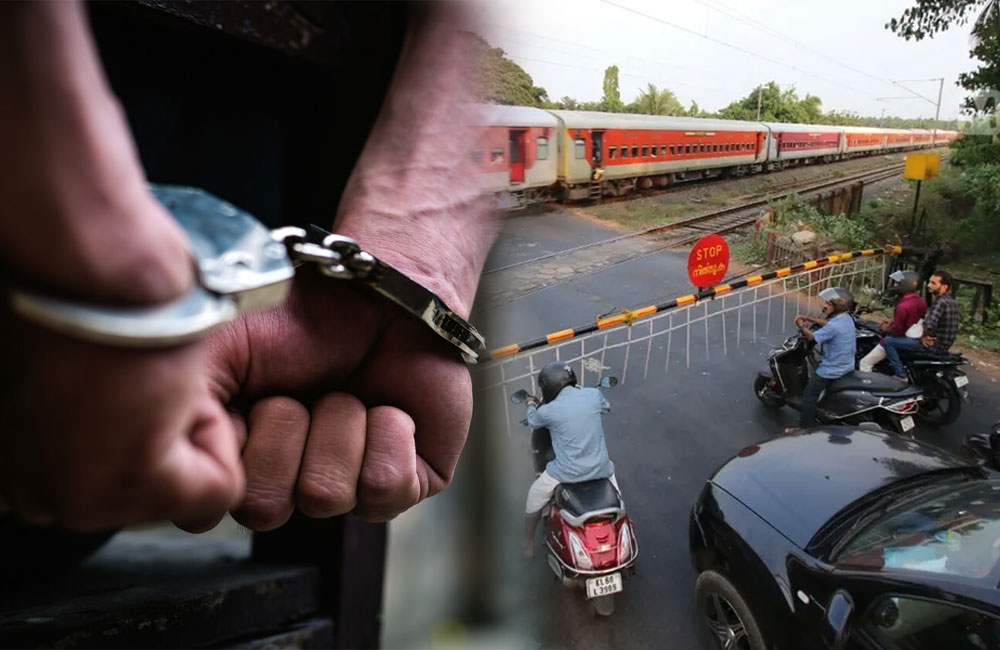
Railway Gate Operator Arrested in Kollupitiya for Reporting to Duty Drunk
A railway gate operator stationed at the highly sensitive Uttarananda Mawatha crossing in Kollupitiya was arrested yesterday after reporting to duty while intoxicated, Railway Department Spokesman Asanka Samarasinghe said.
The crossing—situated between Kollupitiya and Kompannavediya near Temple Trees—is regularly used by ambassadors, senior government officials, and other VIPs, making operational discipline and security crucial.
The arrested operator, identified as Sudath Dhammika, serves as an assistant at the Company Road railway station and also functions as the secretary of the Railway Clerks’ Parallel Services Association. He was immediately suspended from duty by the Secretary to the Ministry of Transport.
According to several railway employees, Dhammika has been linked to previous acts of misconduct and alleged attempts to create internal disputes within the system.
Authorities have taken steps to halt all salary and related payments to him with immediate effect as further inquiries continue.
Page 55 of 657